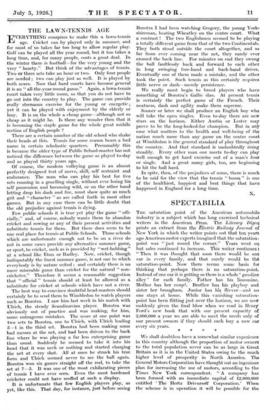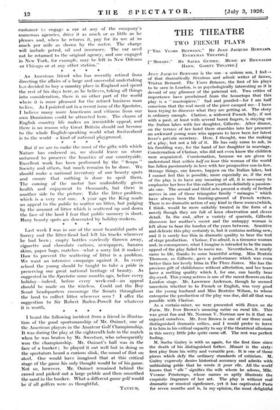SPECTABILIA
THE saturation point of the American automobile industry is a subject which has long exercised technical writers in the American Press. The Literary Digest prints an extract from the Rlectric Railway Jaurnal of New York in which the writer points out that ten years ago American motor experts imagined that the saturation- point was "just round the corner." rears went orp but sales continued to increase. this writer continues t "Then it was thought that soon there Would be one car in every family, and that surely would be the saturation-point. Now there seems some basis for thinking that perhaps there is no saturation-point. Instead of one car it is getting so there is a whole gasoline alley' for each family. rather has his limousine. Mother has her coup. Brother has his playboy and sister her brougham. Junior has his flivver—and no one stays at home. While this vanishing saturation- point has been flitting just over the horizon, We are now suddenly given the final blow when we read in Henry Ford's new book that with our present capacity of 2,000,000 a year we are able to meet the needs only of our present owners if they should each buy a new car every six years.
We shall doubtless have a somewhat similar experience in this country although the proportion of motor owner* to the total population never can be as large in Great Britain as it is in the United States owing to the much higher level of prosperity in North America. The General Motors Corporation have thought out an ingenious plan for increasing the use of motors, according to the Times New York correspondent. "A company has been .formed with an immediate capital of /2,000,000 entitled 'The Hertz Drivurself Corporation.' When the scheme is in operation it will be possible for the customer tb engage a car at any of the company's numerous agencies, drive it as much or as little as he pleases and, when he returns it, pay for its use at -so mUch per mile as shown by the meter. • The charge will include petrol, oil and insurance. The car need not be returned to the original agency, and one engaged in New York, for example, may be left in New Orleans or Chicago or at any other station."
* * An American friend who has recently retired from directing the affairs of a large and successful undertaking has decided to buy a country place in England and spend the rest of his days here, as he believes, taking all things into consideration, there is no other part of the world where it is miare pleasant for the retired business man to live. As I pointed out in a recent issue of the Spectator, I believe many more Americans and citizens from our own Dominions could be attracted here. The charm of English country life Makes an irresistible appeal, and there is no reason why Great Britain should not become to the whole English-speaking world what Switzerland is to the World------a kind of national playground.
But if we are to make the most of the gifts with which Nature has endowed us, we should leave no stone unturned to preserve the beauties of our countryside. Excellent work . has been performed by the t` Scapa" Society and others, but much remains to be done. We should make a national inventory of our beauty spots and ensure that nothing is done to spoil them. The coming of the motor has undoubtedly given health and enjoyment to thousands, but there is another side to the picture. Take the litter problem, which is a very real one. A year ago the King made an appeal to the public to scatter no litter, but judging by the amount of litter which is scattered up and down the face of the land I fear that public memory is short. Many beauty spots are desecrated by holiday-makers. _ * * Last week I was in one of the most beautiful parts of Surrey and the litter-fiend had left his tracks wherever he had been ; empty bottles carelessly. thrown away, cigarette and chocolate cartons, newspapers, banana skins, paper bags, matches—what a sorry list it makes ! How to prevent the scattering of litter is a problem. We want an intensive campaign against it. In every school the young should be taught to take a pride in preserving our great national heritage of beauty. As suggested in the Spectator some months ago, before every holiday—indeed, before every week-end—an appeal should be made on the wireless. Could not the Boy Scout headquarters encourage the Scouts throughout the land to collect litter wherever seen ? I offer the suggestion to Sir Robert Baden-Powell for whatever it is worth.
-* -* 1 heard the following incident from a friend in illustra- tion of the good sportsmanship of Mr. Ouimet, one of the American players in the Amateur Golf Championship. It was during the play at the eighteenth hole in the match when he was beaten by Mr. Sweetser, who subsequently won the championship. Mr. Ouimet's ball was in the face of .a bunker ; he played it out well but in doing so the spectators heard a curious slink, the sound of flint on. steel. One would have imagined that -at this stage of the game his only thought Would be of his game. Not so; however. Mr. Ouimet remained behind the crowd and picked Out a large pebble and then smoothed the sand in the bunker. What a different ganic golf would l)e if all golfers were as thoughtful.
TANTU3L.











































 Previous page
Previous page